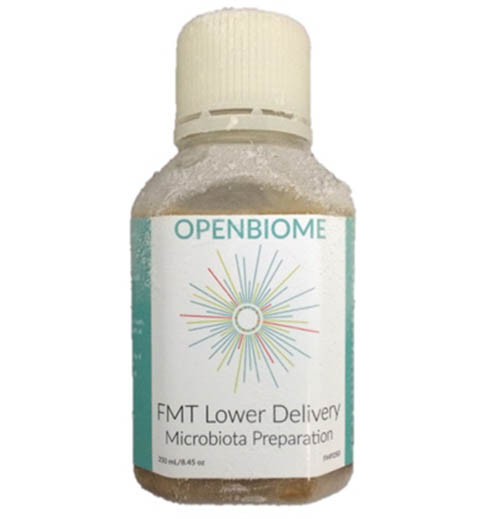Fecal microbiota transplantation (FMT) is the age-old technique of replacing a diseased intestinal microbiome with a health ecosystem from a stool donor. It is currently only done to treat severe, recurrent, or refractory Clostridium difficile infections. I’ve written several articles in the past on this so-called “poop transplant” and you can read some of the background about FMT in the links above. If you don’t have the time to review the very interesting history of the fecal transplant, the shortened version is as follows: Find relative or friend of patient in need of transplant; test donor’s stool and blood (takes several days of waiting); have donor re-donate another bowel movement for the transplant, which needs to be processed by the doctor or staff (somewhat resembling a smelly science experiment); and finally, “transplant” the donor’s stool into the patient via colonoscopy or other methods. It was a cumbersome and timely process, with many steps to discuss with the patient and donor. If it didn’t work so well, with an almost 100% cure rate, I doubt any doctor would go through all the trouble involved with the procedure!

Image: OpenBiome
It was only a matter of time that a fecal transplant product was created. Now instead of having to test an individual donor and mix the stool to prepare the specimen for delivery through the scope, one can simply call the hospital pharmacy several hours before the fecal transplant is scheduled and order a 250 mL bottle of frozen donor stool from OpenBiome, a non-profit stool bank located in Somerville, Massachusetts. The bottle is thawed at room temperature and after about 4 hours, it is ready to go straight from the bottle into the syringes and be delivered into the patient through the colonoscope. Fecal transplant, which until just recently was a technique that required about one week of lead time to identify and test the donor, no less that five phone calls to coordinate the entire process, loss of time answering multiple repetitive questions from all parties involved, and a rather gross procedure to manually prepare the specimen, has now become just as easy as calling the pharmacy to order an antibiotic!
This is good news, since ordering antibiotics is how we got into this whole C. difficile mess in the first place! I have had an opportunity to use the frozen microbiota preparation a few times, and the experience was definitely a good one. The procedure was quicker, cleaner, and there were far less preprocedure time-consuming phone calls to arrange the donor testing.
What is truly different in using frozen instead of fresh donor stool for FMT is the time saving aspect of it. In the past, we would typically wait a long time to decide to perform a fecal transplant for recurrent or refractory C. difficile. Then there was an additional long delay in identifying and testing the donor. Sometimes the donor couldn’t perform on the day of the procedure, or the specimen received was inadequate. Patients were exposed to longer courses of antibiotics and longer-lasting symptoms due to the infection. Now, once the decision is made to perform FMT, the procedure can be done same day or next day!
OK, so using frozen donor stool provided by this company is easier, more convenient, and associated with a significant time-savings when compared to the traditional way of doing it…but does it work? Does the frozen and thawed microbiota survive and cause the desired effect of curing the patient of C. diff? Stay tuned for more on that soon…[Go to the next article: Does frozen stool work for fecal transplants?]
Disclosure: I do not have any financial interest or relationship with OpenBiome.
